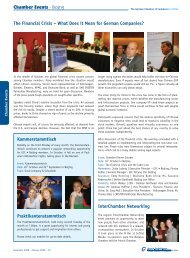Minister Schavan - AHK - AHKs
Minister Schavan - AHK - AHKs
Minister Schavan - AHK - AHKs
Create successful ePaper yourself
Turn your PDF publications into a flip-book with our unique Google optimized e-Paper software.
Business Focus<br />
Sino - German Business<br />
Contrary to popular perception, differences in culture<br />
or personality are seldom the source of interpersonal<br />
or inter-group conflict. The most common cause is<br />
actually the mindsets which predetermine how an<br />
individual perceives another. Such mindsets influence how people<br />
work with individual and cultural differences. Successful global leaders<br />
are flexible, open to new experiences, have well-developed relationship<br />
skills and optimistic attitudes.<br />
In most western-based companies, giving and receiving feedback is<br />
an essential leadership skill. It is important to consider what kind of<br />
training and support China-based managers have had for giving and<br />
receiving feedback, especially whether they have experience doing so<br />
in China.<br />
Prior to entering a western company, many Chinese employees do not<br />
have much experience with western-style feedback which tends to<br />
be verbal and direct. Traditionally, Chinese-style feedback is indirect,<br />
non-verbal and most often negative. However, these days Chinese<br />
employees are increasingly open to receiving improvement-focused<br />
feedback, and when administered correctly, all parties can benefit.<br />
Question: How many of the Leadership Universals have something<br />
to do with Feedback & Performance Management? Answer: All of the<br />
above.<br />
Giving and Receiving Feedback<br />
Different feedback styles can lead to misunderstandings. Often people<br />
from cultures that favor relatively direct and verbal forms of communication<br />
can misinterpret or even completely miss messages that are<br />
less direct or nonverbal. Very direct messages may cause offense to<br />
those who are more cautious about delivering sensitive messages.<br />
When providing feedback in cultures that are more task-oriented,<br />
the person and the task are separated, and the focus is on how to do<br />
the task well. Such cultures find it much easier to give direct, taskoriented<br />
feedback. In more relationship-oriented cultures, the person<br />
and task are not separated, making any type of feedback more personal.<br />
Feelings and facts are both important in these more indirect<br />
June - July 2008 | 16<br />
The German Chamber of Commerce in China<br />
Giving Feedback & Managing Performance<br />
Across Cultures<br />
8 Universal Requirements of Leadership<br />
1. Develop a clear sense of purpose, direction and connection<br />
2. Create relationships of trust and mutual respect<br />
3. Create a climate of open communication and continuous<br />
improvement<br />
4. Establish goals, standards, and accountability<br />
5. Communicate both performance as well as behavioral<br />
expectations<br />
6. Provide tools and resources for success now and later<br />
7. Provide rewards, consequences and performance feedback<br />
8. Lead by example: model the behavior you want<br />
“It’s not our differences that divide us, it’s our judgements about each<br />
other that do.” (Wheatly, 2002) Many German companies in China face<br />
HR retention and staffing struggles. Implementing a constructive feedback<br />
system can help to retain employees and provide motivation for<br />
optimal performance.<br />
cultures when giving critical feedback. When people are aware of different<br />
feedback styles and options, they are able to give and receive<br />
feedback in a style that is more culturally appropriate.<br />
Direct Feedback is Not Always Best<br />
A manager with a small company wanted to replace one of the local<br />
team members. The team member had not measured up to expectations.<br />
Even with direct feedback about performance he was showing<br />
few signs of improvement. However, the team was small and the nonperformer<br />
had a good relationship with all the other team members.<br />
So the manager realized that terminating the team member was going<br />
to have a negative impact on the morale of the remaining team.<br />
Finally he tried an indirect approach. The team member’s employment<br />
contract was nearing the end of its term. The manager mentioned to<br />
some the other colleagues that he was wondering if he should renew<br />
it. He suggested that the nature of the job was going to become more<br />
complex and that the team member in question might not like that<br />
type of work. By relying on the grapevine of the non-performer’s colleagues<br />
to relay the message that the contract would not be renewed,<br />
he gave indirect feedback. A short while later, the non-performer contacted<br />
the manager and said he would not be renewing his contract as<br />
he wished to change his career path. In the end, everyone saved face<br />
and the morale of the team remained intact.<br />
The Feedback Skills Gap<br />
There is a huge need for effective leadership in multi-cultural organizations.<br />
Many companies feel they don’t have an adequate number of competent<br />
global leaders. Most of them believe that their existing leaders<br />
need additional cross-cultural leadership skills – giving and receiving<br />
feedback ranking high on the list. Often organizations select leaders for<br />
international assignments based on technical expertise. Many managers<br />
without experience leading an international team are reluctant to give<br />
constant feedback. Unfortunately, the negative consequences can be<br />
costly. They include: premature termination of the assignment, reduced<br />
organizational morale, lack of cohesion and poor performance.<br />
Why Are Managers So Reluctant to Provide<br />
Feedback?<br />
• Fear of the other person’s reaction - people can become very defensive<br />
and emotional when confronted with feedback and many managers<br />
are very fearful of the reaction<br />
• Fear of de-motivating the receiver of the feedback instead of motivating<br />
the receiver to improve<br />
• The feedback may be based on subjective feeling and the manager<br />
may be unable to give concrete information if the other person<br />
questions the basis for the feedback
















